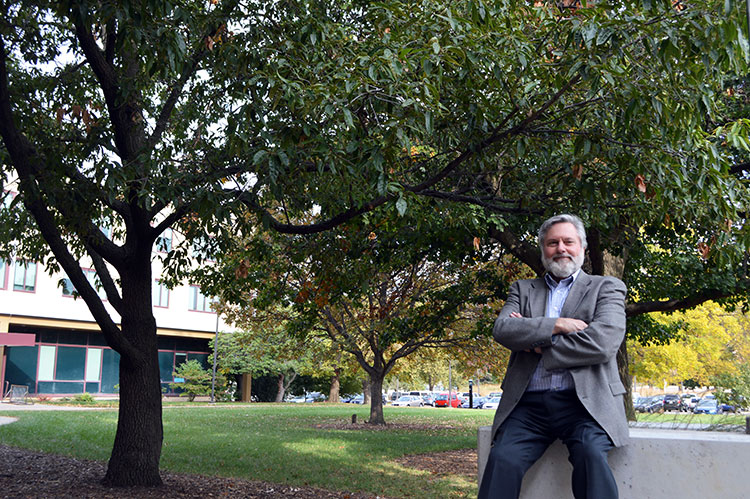
Art Zygielbaum's involvement with the recently announced $13.5 million multi-institutional research effort to improve sorghum as a sustainable source for biofuel production may end up affecting his sleeping habits.
"You didn't ask me how I was going to handle the added responsibility brought on by such a large and visible grant," said Zygielbaum, SNR associate research professor. "I think I'm going to have to forgo sleeping for a while."
Jokes – or at least, half-jokes – aside, Zygielbaum is undoubtedly excited about the project, which aims to better understand how plants and microbes interact, and to learn which sorghum germplasm grows better with less water and nitrogen.
For his part, Zygielbaum will use remote sensing techniques developed by UNL's Center for Advanced Land Management Information Technologies, in addition to techniques developed elsewhere, to estimate phenotypic characteristics of plants such as the biomass, amount of pigments and amount of water in the leaves.
"Remote sensing is easier and faster than physically weighing plants or performing chemical analysis to determine the level of pigments," Zygielbaum said. "Demonstration that remote sensing techniques can make such estimates within the accuracy needed by plant breeders is the goal."
Moreover, applying remote sensing techniques to the breeding of sorghum and subterranean biome systems will likely impact future research in remote sensing itself, Zygielbaum said.
"What we learn in the process will ultimately result in a better understanding of the mechanisms that keep plants healthy and productive despite stress factors like lack of water and poor soils," he said.
Funded by the Department of Energy, the five-year grant demands expertise from a wide range of disciplines and institutions. UNL is working with scientists at Danforth Plant Science Center, Washington State University, University of North Carolina-Chapel Hill, Boyce Thompson Institute, Clemson University, Iowa State University, Colorado State University and the DOE-Joint Genome Institute.
Daniel Schachtman, professor of agronomy and horticulture and director of UNL's Center for Biotechnology, is leading the UNL team, which consists of Zygielbaum and Ismail Dweikat, sorghum breeder and professor of agronomy and horticulture.
Too often, Zygielbaum said, a lot of science is "done in isolation" and interdisciplinary collaboration is overlooked.
"We care deeply about our own research area and sometimes fail to look over the wall to see what interesting things others are engaged in," he said. "Frequently, and the new grant is such a case, research in one area of science can help to solve a research problem in another. Bringing together researchers in different disciplines helps identify areas of common interest and brings new minds to bear on sometimes very difficult problems."
In short, this high-profile grant is also a high-profile chance to learn something new.
"This is an opportunity to learn," Zygielbaum said. "The grant offers me a chance to work with outstanding scientists like Daniel Schachtman. I look forward to learning more about plant breeding, the critical problems they face, and how my research interests and skills can help them accomplish their goals."
— Mekita Rivas, Natural Resources